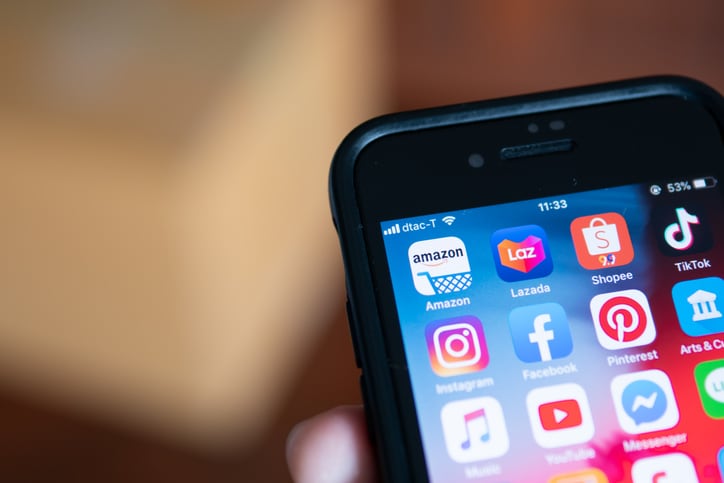While this trend shows the growing role of digital platforms in shaping health behaviours, the study raises red flags over the lack of scrutiny toward the quality and credibility of that information.
The study — conducted by researchers at the Research Institute of Medical and Health Sciences and University of Sharjah — noted that these young adults focused more on how easy it was to access information, not whether it was backed by science.
Instagram leads the pack, but trust in evidence is low
The study surveyed 400 university students at the University of Sharjah, the largest higher education institution in the UAE. Among them, 261 respondents (about 65%) said they used social media to get information on nutrition. Instagram was by far the most used platform, followed by Snapchat, YouTube and TikTok.
Worryingly, when asked what mattered most in choosing where to get their nutrition advice online, 63.6% of students chose ease of use; only 12.6% said scientific evidence was a top priority.
Women and weight loss seekers most engaged
The research also found clear demographic trends. Women were nearly twice as likely as men to use social media for nutrition, and students trying to lose weight were also more likely to seek out diet-related content online. The study’s authors said this made them the most vulnerable to misleading information.
Students with existing health conditions, however, were significantly less likely to turn to social media for nutritional advice. The authors suggested this group might prefer direct advice from healthcare professionals.
Sharing information with friends, not doctors
One of the study’s most concerning findings was that while 93% of users shared nutrition tips from social media with friends or family, only 23% ever discussed this content with healthcare providers.
This indicated that social media wasn’t just a source of information but also a channel of influence, largely outside of professional healthcare settings.
Despite this, over 90% of students said they would be open to using social media to communicate directly with healthcare professionals. This signalled a significant opportunity for clinics, dietitians and wellness brands to meet young adults where they already are — online.
Health risks from misinformation and influencer marketing
Unchecked spread of health and nutrition content on social platforms, especially when driven by influencers without proper credentials, can do more harm than good. This is particularly concerning because anyone could post anything and frame it as advice, including influencers with no training but with massive reach.
The study’s authors mentioned that brands would pursue promotional relationships with influencers due to their reach and impact, and young adults consuming their content were more likely to exhibit similar behaviours, which lacked “scientific evidence base”.
For example, previous research reported how influencers promoted products of questionable origin, like e-cigarettes and weight loss supplements, for monetary compensation on social media platforms popular among young adults.
If you can’t beat them, join them
The study’s findings pointed to an opportunity for healthcare professionals to use social media to create compelling but credible content to “counteract the spread of misinformation and connect with young audiences effectively”. Additionally, the researchers encouraged policymakers to work with platform developers to introduce regulations “ensuring transparency regarding content creators’ credentials and sources of information”.
They explained that this could include mandating labels to verify credible accounts, flagging unsubstantiated claims, or introducing disclaimers for posts containing unverified nutritional advice. To facilitate accountability, governments and health organisations could partner with social media platforms to establish guidelines to minimise misinformation and incentivise “evidence-based content through visibility algorithms”.
The researchers also suggested public health initiatives could use social media’s peer-sharing dynamics by encouraging the distribution of credible, evidence-based nutrition information among young adults. Together, they said, these approaches could maximise social media’s potential as a tool to promote accurate, useful nutritional advice while mitigating the risks of misinformation.
Study limitations and next steps
While the study was large for a single university, the authors still acknowledged certain limitations. For instance, the findings may not fully represent all young adults in the UAE, especially those not in university settings. At the same time, self-reporting could have led to bias.
Still, with 99% of UAE adults using social media — and spending an average of 7.5 hours per day online — the researchers believed their findings were part of a larger trend. They also presented an opportunity to guide young adults toward healthier decisions. However, this would require the nutrition industry, healthcare providers and policymakers to collaborate.
They concluded: “Addressing the lack of prioritisation for scientific evidence through media literacy campaigns and algorithmic adjustments is crucial.
“Future research should explore the long-term impact of social media on dietary behaviours, while healthcare professionals and policymakers should collaborate to enhance content transparency and counter misinformation effectively. Ultimately, integrating these efforts can safeguard against misinformation while encouraging healthier behaviours.”
Source: National Center for Biotechnology Information
“Characteristics and correlates of the use of social media for nutrition among young adults in the United Arab Emirates”
https://www.doi.org/10.1186/s12889-025-22158-9
Authors: Sharfa Khaleel, et al.

